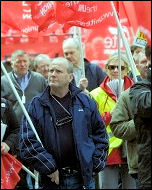No to Budget’s pay and benefit cuts
Stop budget attacks with mass action

Unite and RMT on demonstration, photo by Paul Mattsson
The Tory/Lib Dem budget included a rise in VAT to 20%, a pay freeze for most public sector workers and the cutting and erosion of a number of key benefits – including housing benefit.
Judy Beishon
These vicious measures will hit millions of workers and the poorest people in society very hard, and there is much more to come, such as large-scale public sector job losses and attacks on pensions. At the same time, the richest in society were handed the lowest rate of corporation tax of any major western economy, a cut to 24% over the next three years.
But does the final word on the government’s destruction of jobs, welfare and services lie with 23 Tory and Lib Dem cabinet ministers, or with the seven million trade unionists who don’t want to see the living standards of ordinary people degraded?
The potential strength of the trade unions is massive. They can ultimately decide, through collective action, what is done, made, and moved in society. They would receive huge support from their members and from workers beyond their present membership if a determined fightback against the government’s attacks is conducted.
The bosses’ organisation, the Confederation of British Industry (CBI), has pleaded with the government to do more to prevent “debilitating strike action” by trade unions in response to the cuts. Yet it should be the Trades Union Congress (TUC) that is in the forefront of warning of strike action, and from an entirely opposite point of view – that of the interests of working class and middle class people.

Jobs demo in Birmingham called by the Unite trade union , photo Paul Mattsson
Our welfare state is under attack, the biggest attack since its creation. The entire public sector is being hacked away relentlessly by this new government, carrying on from where New Labour left off.
This onslaught can be stopped, but only if the destructive zeal of the government ministers is met with an equally determined and intransigent response from ordinary working people – saying NO to cuts, job losses and privatisation.
For a start, the TUC should call an emergency meeting – as Bob Crow, RMT transport union leader, has publicly demanded – and should as a first step set a date for a national demonstration, against cuts to jobs, pensions, pay, benefits and services.
Then, that event needs to be properly prepared for and organised, it is not enough just to call it. It would most likely be tens of thousands strong even if the trade unions do not properly mobilise for it, but it would attract hundreds of thousands of people if they do mobilise.
This would mean producing hundreds of thousands of leaflets and posters, organising the distribution of them throughout the trade union movement and issuing guidelines for getting them into as many workplaces and communities as possible.
It would mean the TUC and major unions funding prominent national adverts, and trade union leaders using every media interview and article they are involved in, to explain about the demonstration and urge workers and their families to participate in it.
The trade union leaders also need to put forward a plan of action for after the demonstration, in particular a call for a one-day public sector strike. Again, this needs to be thoroughly prepared for at all levels of the labour and trade union movement, and the National Shop Stewards Network would also be able to play an important role in building for it (see page 5).
The driving down of the living standards of a vast layer of workers in society is not inevitable. The government can be stopped in its tracks if a mighty opposition movement is built up.







